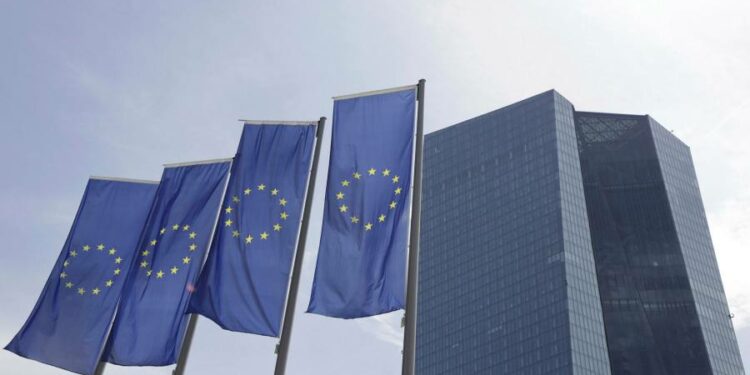The European Central Bank has pledged to accelerate work on a “new anti-fragmentation instrument” to tackle surging borrowing costs in weaker eurozone economies after an emergency meeting of its rate-setters on Wednesday.
“The pandemic has left lasting vulnerabilities in the euro area economy which are indeed contributing to the uneven transmission of the normalisation of our monetary policy across jurisdictions,” the central bank said in a statement after its meeting.
Italian bonds gave up part of their earlier gains following the ECB’s announcement, pushing yields higher. Italy’s 10-year yield rose to 3.92 per cent, up from an earlier low of 3.76 per cent, but still below Tuesday’s closing level of 4.18 per cent.
The euro fell slightly but remained 0.2 per cent higher on the day at $1.043 against the US dollar. The meeting comes ahead of the Federal Reserve’s monetary policy decision on Wednesday with the market expecting the US central bank to raise rates by 0.75 percentage points.
The central bank also said it would “apply flexibility” in the way it reinvests the proceeds of the bonds that will mature in the €1.7tn portfolio of assets bought to counter the impact of the coronavirus pandemic. Analysts have estimated the ECB could muster €200bn of extra firepower to buy bonds of vulnerable governments through these reinvestments.
Silvia Merler, of Algebris Investments, said the announcement “buys time” for the ECB, adding that it was “probably the best one could expect out of today’s emergency meeting, but does not take them out of the corner yet”.
The meeting, which comes less than a week after the rate-setting governing council’s last vote, had raised investor expectations that the central bank was preparing to announce a policy instrument to stave off another debt crisis in the region.
Italian government bonds rallied in price following news of the meeting, reversing some of the recent sell-off that analysts said brought the country’s borrowing costs towards the “danger zone”.
The eurozone central bank disappointed investors last Thursday with a lack of detail over when or how it would intervene in government bond markets to tackle so-called financial fragmentation, which had raised the costs of borrowing for vulnerable southern European countries more than for their northern neighbours.
The gap, or spread, between Italian and German borrowing costs had widened to 2.4 percentage points, double last year’s level and up from about 2 percentage points before last week’s ECB meeting when rate-setters signalled an end to ultra-loose monetary policy by announcing plans to stop buying more bonds and start raising interest rates.
ECB executive board member Isabel Schnabel indicated in a speech on Tuesday evening that the central bank was getting closer to the point where it would intervene in bond markets, saying “some borrowers have seen significantly larger changes in financing conditions than others since the start of the year”.
She added: “Such changes in financing conditions may constitute an impairment in the transmission of monetary policy that requires close monitoring.”
Schnabel, the ECB executive who oversees the bank’s market operations and is one of the most influential voices on its board, said the central bank’s commitment to the euro had no limits. “And our track record of stepping in when needed backs up this commitment,” she added.
The last time the ECB called an unscheduled board meeting was at the start of the pandemic in March 2020, when it launched a vast bond-buying scheme to counter the sharp sell-off in debt of more vulnerable eurozone countries such as Italy.
ECB president Christine Lagarde is planning to continue with a trip to the UK on Wednesday evening to receive an honorary degree from the London School of Economics, where she is due to speak at an event.
Additional reporting by Tommy Stubbington











